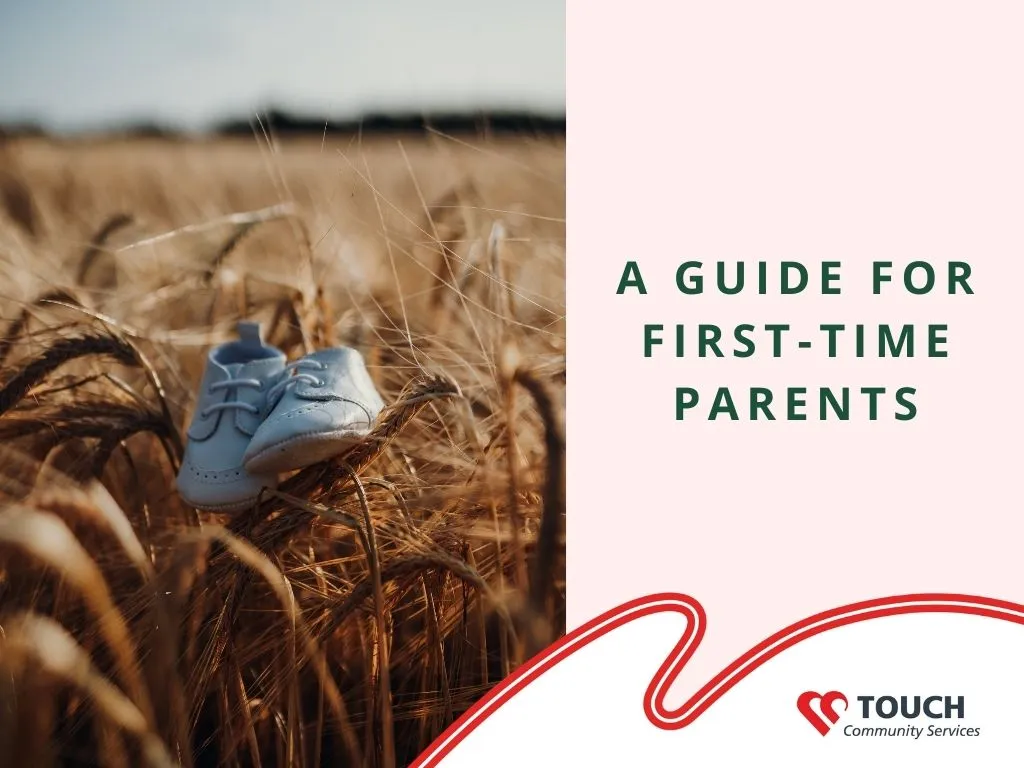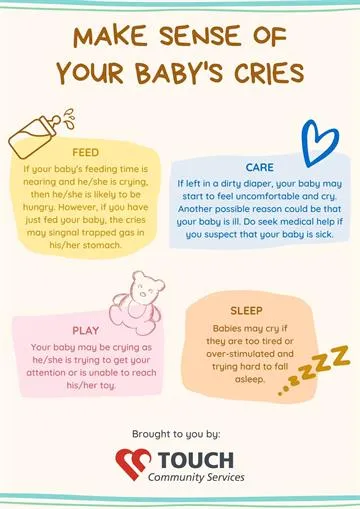A Guide for First-Time Parents

Caring for a newborn baby can be stressful especially for first-time parents. Apart from tending to your newborn and adjusting to a new schedule, you will also need to manage relationships with your spouse and other family members, as well as fulfil work commitments. Being equipped with some parenting knowledge and skills can definitely help to make this transition easier!
In this article, Family Life Educator and Counsellor at TOUCH Parenting, Mr Nigel Wong, shares some tips on how to ease into first-time parenthood.
Understand your baby’s cries
Babies communicate with their parents primarily through crying, and they may cry for various reasons. For example, not every cry is an indication that the baby is hungry. The baby may be uncomfortable due to trapped gas after a feed or may be learning to self-sooth while trying to fall asleep after being put to bed.
Generally, your baby’s cries may be attributed to any of these four areas – Feed (expressing hunger), Care (expressing discomfort), Play (expressing a need for attention) and Sleep (expressing tiredness). You may refer to the infographic below for more information. One way to better identify why your baby is crying is to keep a baby journal so that you can learn to understand the trends and patterns in your baby’s cries.

Keep a baby journal
It is useful to record the following information in a baby journal: time of feeding, type of milk, amount of milk, number of soiled diapers, sleep duration and more.
There are many benefits to keeping a baby journal. Keeping a detailed record allows you to observe trends and helps you to better make sense of your baby’s behaviour. The recorded information can also be shared with your pediatrician should your baby display any abnormal behaviour.
In addition, a baby journal is a useful tool to help keep your spouse informed of your baby’s daily routine. It helps to mentally prepare your spouse before he/she takes over caring for the baby at certain times or on certain days.
You may download a sample of the Baby Journal template here.Consider attending parenting workshops
As working adults, we constantly upgrade ourselves so that we can be relevant at work. We can apply the same principles in parenting. Parenting is a lifelong journey and it is impossible to know everything about it. When you attend parenting workshops, you are able to gain new knowledge and improve your parenting skills, thus building your confidence in managing and caring for your baby.
Practise self-care
It is important for first-time parents to take care of your mental and emotional wellbeing. Here are some self-care tips that may help you and your spouse better manage your experience as first-time parents.
- Take a break
As parents, you may tend to stay hypervigilant as you would want to constantly be there for your baby, and this can be energy-draining for you. It is important to give yourself a break by:
- Talking to someone about your emotions and anxieties to get emotional support
- Joining a group or community which has expertise in areas that you are most concerned about. For example, you may choose to join a support group for breastfeeding, sleep routine or health related issues. As you hear about the experiences of others, you may gain tips on how to manage your baby and know that you are not alone.
- Scheduling a break for yourself at least once a week by arranging a caregiver for your child. This helps you to recharge mentally and physically.
- Manage expectations
It is important to prioritise the well-being of parents over being fixated on achieving a set of goals. Parents can exercise some flexibility in making adjustments to these goals. Here are some examples of how frustration can result from unmet expectation and goals:
- Having the desire to make sure that the house is extremely neat and tidy while juggling the need care for your baby as the only caregiver.
- Expecting your baby to not be fussy or be able to sleep through the night within a short period of four months.
- Get your spouse involved
Giving your spouse a chance to take care of the baby not only gives you a break but it also gives your spouse an opportunity to spend quality time with the baby. From sharing physical touch while bathing your baby to hearing your voice while your baby is being fed, these activities can help build the parent-baby bond.
Want to learn more on how to better care for your newborn? Sign up for G.I.F.T. Parenting, a programme by TOUCH Parenting, and discover useful information and practical skills to help you manage, nurture and bond with your baby!
If you have enquiries on the programme or if you need someone to talk to about your parenting challenges, please contact TOUCH Parenting at parenting@touch.org.sg.
TOUCH Parenting aims to strengthen parent-child relationships by providing parents with relevant parenting resources through every stage of their parenting journey. It conducts informative talks and workshops which empower parents with knowledge on preparing for and raising a new-born, navigating the digital age with their child, parent-child communication, and nurturing resilient children and youths. It is also appointed by the Ministry of Social and Family Development as the Parent Support Provider (PSP) for Primary and Secondary schools in Singapore.


